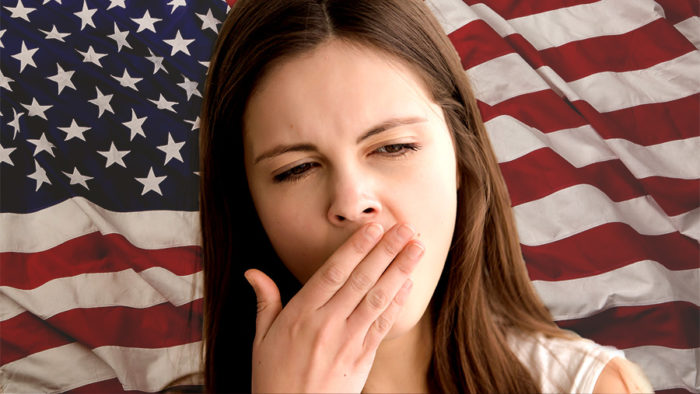If you’ve ever wondered what’s wrong with Millennials, it could be what they think about America.
Or maybe I should say it’s what we think.
I am a Millennial living in our nation’s capital. Washington, D.C. is looking her absolute finest this time of year. Bright red, white and blue blows throughout the streets and there is an air of excitement as locals and tourists pack together on the mall to watch the fireworks explode over the monuments.
The 4th of July is my absolute favorite holiday—but it isn’t for many of my fellow Millennials.
The Millennial generation has earned plenty of labels. Patriotic certainly isn’t one of them.
Every generation of youth rebels against the establishment. They push boundaries and question the decisions of those in charge. We say they’re still “coming of age” or joke that “they haven’t paid taxes yet.”
But the lack of patriotic youth is different with Millennials, and it may not change anytime soon.
Millennials Don’t See Themselves as “Patriotic”
Millennials aren’t joining the military. A recent study found 85% of Millennials showing no interest serving in the military. Compared to Millennials, men from Generation X are twice as likely to have served in the military at some point in their lives. Baby Boomers are six times as likely. A young man who was born in 1963 was 11 times likelier to have served than a Millennial man is today.
Millennials don’t consider themselves patriotic. According to Pew Research, only about half of Millennials say the phrase “a patriotic person” describes them very well—with 35% saying this is a “perfect” description. Just compare that to 64% of Gen Xers, 75% of Boomers and 81% of Silents who say this describes them very well.
In my 11 years of researching Millennials, I have discovered some interesting, inspiring and daunting truths about my generation.
Millennials are more likely to consider themselves citizens of the world than citizens of the United States.
Millennials do not believe in American exceptionalism… or at least they would be very hesitant to call America, “The best country in the world.”
Millennials take a globalist approach to world affairs and are more concerned with how our actions are perceived and affected around the world than our parents were at their age.
The cause is threefold.
Millennials are less likely than other generations to associate with political parties, churches or affinity groups. We want to be seen as independent in our thoughts and actions and do not need to be associated with a particular country to feel like we belong here.
Millennials have been raised with anti-bullying campaigns and societal discussions about privilege and access. This has heightened our awareness to those who have and those who have not. This, mixed with how our history was framed in public and higher education has caused many in my generation to express disappointment in who we are as a world power.
And of course, we were given trophies for participating, which taught us that being #1 isn’t the only goal of a game. It matters how you win the game.
Not All Is Lost
Not all Millennials have lost respect for our country. I know many young people (myself included) consider pledging allegiance to the flag a privilege, not a duty. This is not an editorial on what is wrong with my generation. In truth, I believe Millennials are more equipped to change the world than our predecessors were at our age. I believe our social awareness can be used for America’s benefit, and our love of justice and pride for our country are not mutually exclusive.
As you celebrate America’s birthday with your family and friends, consider what Millennials love about America may not be what you love about America. It’s up to you to find out why.
Gabrielle Bosche, stream.org
 Listen Online
Listen Online Watch Online
Watch Online Find a Station in Your Area
Find a Station in Your Area









 Listen Now
Listen Now Watch Online
Watch Online
